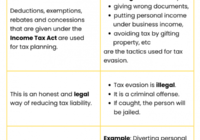Tax planning and tax evasions?
Tax planning and tax evasions Taxation planning and tax evasions are two distinct concepts with stark differences: Tax Planning: Tax planning involves structuring one’s financial affairs in a legal and strategic manner to minimize tax liability. It involves taking advantage of available deductions, credits, exemptions, and incentives provided by tax laws to legally reduce… Read More »








